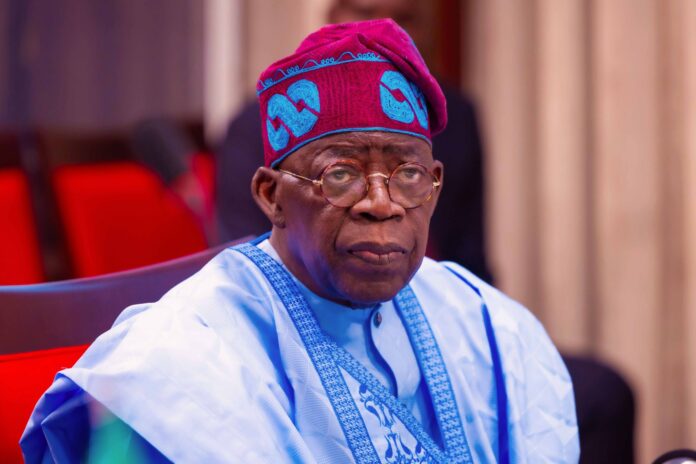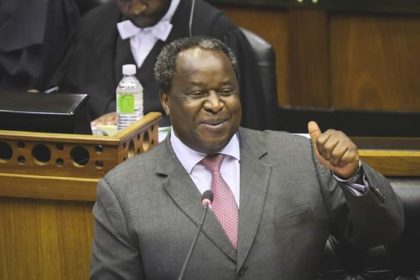By Adeyemi Adekunle
In the face of skepticism and economic challenges, President Bola Tinubu has projected a resolute vision for Nigeria, declaring the nation is on a path of recovery.
During his first presidential media chat since assumed office in 2023 held in Lagos State on Monday night, Tinubu emphasized his administration’s commitment to restoring hope, despite the criticisms surrounding his 2025 “Restoration Budget.”
“Nigeria is moving forward regardless of critics. This is a budget of restoration of hope, and Nigeria is on the path of recovery. We can’t finish the job in one calendar year,” Tinubu stated firmly, addressing both detractors and supporters. His words encapsulate a narrative of resilience and optimism, even as the nation grapples with economic turbulence and social unrest.
The proposed 2025 budget, tagged as the “Restoration Budget: Securing Peace and Building Prosperity,” carries ambitious goals and hefty financial commitments. It outlines an aggregate expenditure of N47.9 trillion, with revenue projections of N34.82 trillion—leaving a substantial deficit of N13.08 trillion. The allocations reflect Tinubu’s policy priorities: N4.91 trillion for defense and security, N4.06 trillion for infrastructure, N3.5 trillion for education, and N2.48 trillion for health.
However, the most striking figure in the budget is the N15.81 trillion earmarked for debt servicing—a sobering reminder of Nigeria’s economic realities. With inflation at 34.6% and an exchange rate hovering around N1,700 per US dollar, Tinubu’s administration faces significant hurdles in delivering on its promises.
The president’s optimism, though inspiring, has not been universally embraced. Many Nigerians, weary from years of economic hardship, view the budget as a high-stakes gamble. For some, it’s a bold step toward a brighter future. For others, it raises questions about feasibility and equity.
Tinubu’s assurance that inflation will drop to 15% by the end of 2025 and that the exchange rate will stabilize at N1,500 per US dollar has drawn mixed reactions. Critics argue these targets are overly ambitious, especially considering Nigeria’s dependence on oil exports and the volatility of global energy markets.
“This budget tells a bold and exciting story of the direction we are taking to retool and revamp the socio-economic fabric of our society,” Tinubu said during his presentation to the National Assembly last Wednesday. Yet, behind the bold rhetoric lies the challenge of implementation, a task fraught with political, economic, and social complexities.
The budget has already passed its second reading in both the Senate and the House of Representatives, signaling legislative support for Tinubu’s vision. However, the public remains divided, with many citizens expressing concern over the potential impact of the budget on their daily lives.
For the average Nigerian, economic recovery feels like a distant promise. Inflation has eroded purchasing power, and the recent removal of fuel subsidies—another controversial decision by Tinubu—has exacerbated the cost of living crisis. Fuel prices have soared, transportation costs have skyrocketed, and businesses are struggling to stay afloat.
In Lagos, street vendor Adamu Yusuf lamented the rising cost of goods. “We hear about big budgets, but what about us? Everything is expensive now. How will this budget help people like me?” he asked, echoing the sentiments of many Nigerians who feel disconnected from the government’s lofty economic projections.
Similarly, students and educators have raised concerns about the allocation for education. While N3.5 trillion has been earmarked for the sector, many argue it is insufficient to address the systemic issues plaguing Nigerian schools. Poor infrastructure, inadequate teacher training, and high dropout rates remain significant challenges.
Healthcare advocates have also voiced reservations. Despite the N2.48 trillion allocation, the sector continues to suffer from underfunding, brain drain, and limited access to quality care, particularly in rural areas.
Dr. Chinyere Okafor, a physician in Abuja, highlighted the disconnect between budgetary allocations and real-world outcomes.
“We see numbers on paper, but on the ground, nothing changes. We need more accountability and effective implementation,” she said.
Security, a major focus of the budget, is another contentious issue. While N4.91 trillion has been allocated to defense and security, questions persist about how these funds will be utilized to combat terrorism, banditry, and other forms of violence that have destabilized parts of the country.
Despite these challenges, Tinubu has urged Nigerians to remain patient and resilient. During his media chat, he praised the resilience of the Nigerian people amid growing economic pressures. “The Nigerian spirit is unbreakable. We are a nation of strong, resourceful people, and together, we will overcome these challenges,” he said.
Tinubu’s administration is also banking on increased oil production to boost revenue. The budget assumes a daily crude oil production rate of 2.06 million barrels, a target that some experts view as optimistic given the nation’s history of production shortfalls and the threat of oil theft.
As the nation watches closely, Tinubu’s leadership faces its greatest test yet: delivering on the promises of recovery and hope. The stakes are high, and the margins for error are slim.
For many, the “Restoration Budget” represents more than just numbers—it symbolizes the administration’s commitment to addressing decades of economic mismanagement, corruption, and social inequality. But for others, it’s a reminder of the widening gap between political rhetoric and the harsh realities of life in Nigeria.
A human rights advocate Aisha Bello captured the dichotomy of hope and skepticism: “This budget is a gamble. It could set us on the path to prosperity, or it could deepen the inequalities we already face. The question is, who will hold the government accountable?”
As 2025 approaches, the eyes of the nation—and indeed the world—are fixed on Nigeria. Tinubu’s bold vision has set the stage for a critical chapter in the country’s history. Whether it will be a story of recovery or a cautionary tale of unmet expectations remains to be seen.
For now, Nigerians are left with cautious optimism, mixed emotions, and the enduring hope that their nation can rise above its challenges and move toward a brighter, more equitable future.




